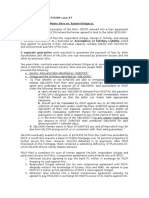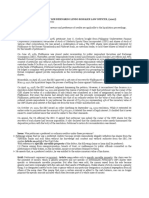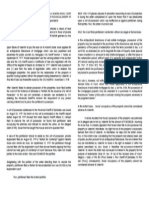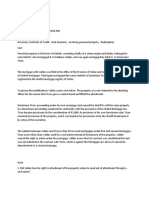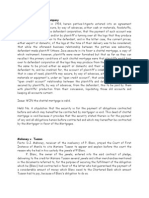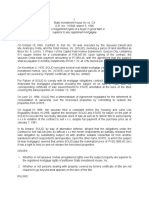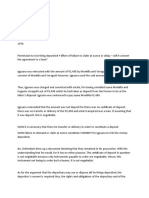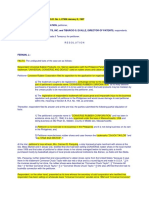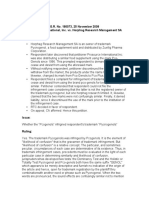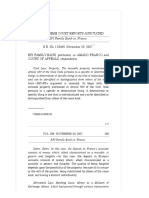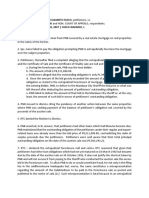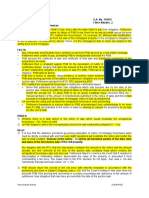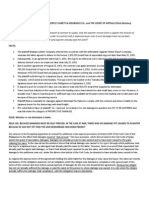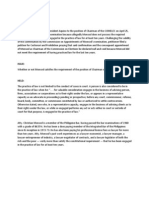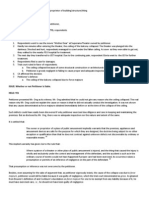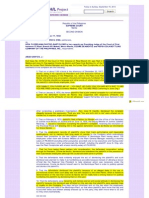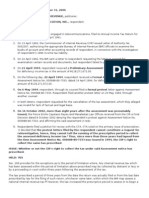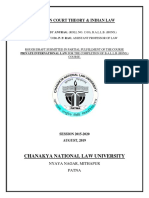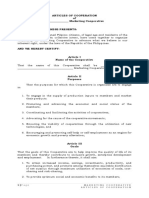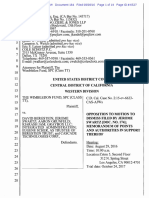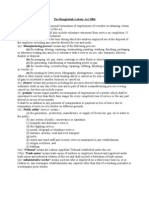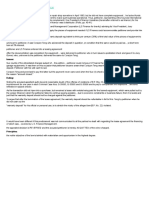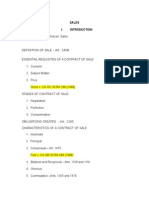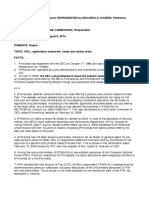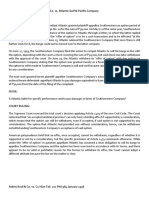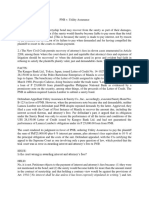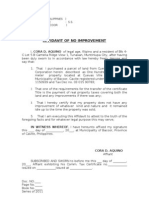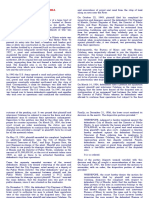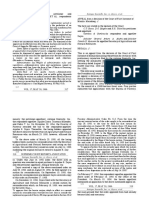Sps Suico Vs PNB
Sps Suico Vs PNB
Uploaded by
Maria Raisa Helga YsaacCopyright:
Available Formats
Sps Suico Vs PNB
Sps Suico Vs PNB
Uploaded by
Maria Raisa Helga YsaacOriginal Description:
Original Title
Copyright
Available Formats
Share this document
Did you find this document useful?
Is this content inappropriate?
Copyright:
Available Formats
Sps Suico Vs PNB
Sps Suico Vs PNB
Uploaded by
Maria Raisa Helga YsaacCopyright:
Available Formats
G.R. NO. 170215 SPS. ESMERALDO AND ELIZABETH SUICO vs. PHILIPPINE NATIONAL BANK AND HON.
COURT OF APPEALS FACTS: 1. 2. 3. Spouses Suico obtained a loan from PNB secured by a real estate mortgage on real properties in the name of the former. Sps. Suico failed to pay the obligation prompting PNB to extrajudicially foreclose the mortgage over the subject properties. Petitioners, thereafter filed a complaint alleging that the extrajudicial foreclosure conducted and the Certificate of Sale and the Certificate of Finality sale are null and void; a. During the foreclosure sale, PNB was the lone bidder. b. The amount of bid is P8,511,000.00. c. Petitioners alleged that the outstanding obligation is only P1,991,770.38. d. Since the amount of the bid grossly exceeded the amount of petitioners outstanding obligation as stated in the extrajudicial foreclosure of mortgage, it was the legal duty of the winning bidder, PNB, to deliver to the Mandaue City Sheriff the bid price or what was left thereof after deducting the amount of petitioners outstanding obligation. e. PNB failed to deliver the amount of their bid to the Mandaue City Sheriff or, at the very least, the amount of such bid in excess of petitioners outstanding obligation. PNB moved to dismiss citing the pendency of another action between the same properties where PNB was seeking payment of the balance of petitioners obligation not covered by the proceeds of the auction sale. RTC denied the Motion to Dismiss. PNB asserted, in its answer, that petitioners had other loans which had likewise become due. PNB maintained that the outstanding obligation of the petitioners under their regular and export- related loans was already more than the bid price of P8,511,000.00, contradicting the claim of surplus proceeds due the petitioners. Petitioners were well aware that their total principal outstanding obligation on the date of the auction sale was P5,503,293.21. RTC declared the extrajudicial foreclosure null and void. a. RTC reasoned that given that petitioners had other loan obligations which had not yet matured on 10 March 1992 but became due by the date of the auction sale on 30 October 1992, it does not justify the shortcut taken by PNB and will not excuse it from paying to the Sheriff who conducted the auction sale the excess bid in the foreclosure sale. To allow PNB to do so would constitute fraud, for not only is the filing fee in the said foreclosure inadequate but, worse, the same constitutes a misrepresentation regarding the amount of the indebtedness to be paid in [11] the foreclosure sale as posted and published in the notice of sale. Such misrepresentation is fatal because in an extrajudicial foreclosure of mortgage, notice of sale is jurisdictional. Any error in the notice of sale is fatal and invalidates the notice. CA reversed. a. Petitioners offered to redeem the properties several times from 6.5M to 7.5M. b. All those offers made by the [petitioners] not only contradicted their very assertion that their obligation is merely that amount appearing on the petition for foreclosure but are also indicative of the fact that they have admitted the validity of the extra judicial foreclosure proceedings and in effect have cured the impugned defect. c. Even assuming that indeed there was a surplus and the [PNB] is retaining more than the proceeds of the sale than it is entitled, this fact alone will not affect the validity of the sale but simply gives the [petitioners] a cause of action to recover such surplus. d. Such failure of PNB does not constitute jurisdictional defect.
4.
5. 6.
7.
8.
ISSUE: Whether or not the extrajudicial foreclosure is valid. HELD: YES
Petitioners argue that since the Notice of Sheriffs Sale stated that their obligation was only P1,991,770.38 and PNB biddedP8,511,000.00, the said Notice as well as the consequent sale of the subject properties were null and void. It is true that statutory provisions governing publication of notice of mortgage foreclosure sales must be strictly complied with, and that even slight deviations therefrom will invalidate the notice and render the sale at [19] least voidable. Nonetheless, we must not also lose sight of the fact that the purpose of the publication of the Notice of Sheriffs Sale is to inform all interested parties of the date, time and place of the foreclosure sale of the real property subject thereof. Logically, this not only requires that the correct date, time and place of the foreclosure sale appear in the notice, but also that any and all interested parties be able to determine that what is about to be sold at the foreclosure sale is the real property in which they have an interest. Notices are given for the purpose of securing bidders and to prevent a sacrifice of the property. If these objects are attained, immaterial errors and mistakes will not affect the sufficiency of the notice; but if mistakes or omissions occur in the notices of sale, which are calculated to deter or mislead bidders, to depreciate the value of the property, or to prevent it from bringing a fair price, such mistakes or omissions will be fatal to the validity of the notice, and also to the sale made pursuant thereto. Petitioners failed to convince this Court that the difference between the amount stated in the Notice of Sale and the amount of PNBs bid resulted in discouraging or misleading bidders, depreciated the value of the property or prevented it from commanding a fair price. Considering the amount of PNBs bid of P8,511,000.00 as against the amount of the petitioners obligation of P1,991,770.38 in the Notice of Sale, is the PNB obliged to deliver the excess? YES. Section 21 of Rule 39 emphasized that if the amount of loan is equal to the bid, there is no need to pay the amount in cash. Same provision mandates that in the absence of a third-party claim, the purchaser in an execution sale need not pay his bid if it does not exceed the amount of the judgment; otherwise, he shall pay only the excess. The ratio is that it would be senseless for the Sheriff conducting the foreclosure sale to go through the ceremony of receiving money and giving it back to the creditor. Under Rule 68, Section 4, the disposition of the proceeds of the sale in foreclosure shall be as follows: (a) (b) (c) (d) first, pay the costs secondly, pay off the mortgage debt thirdly, pay the junior encumbrancers, if any in the order of priority fourthly, give the balance to the mortgagor, his agent or the person entitled to it.
Based on the foregoing, after payment of the costs of suit and satisfaction of the claim of the first mortgagee/senior mortgagee, the claim of the second mortgagee/junior mortgagee may be satisfied from the surplus proceeds. The application of the proceeds from the sale of the mortgaged property to the mortgagors obligation is an act of payment, not payment by dacion; hence, it is the mortgagees duty to return any surplus in the selling price to the mortgagor.
Perforce, a mortgagee who exercises the power of sale contained in a mortgage is considered a custodian of the fund and, being bound to apply it properly, is liable to the persons entitled thereto if he fails to do so. And even though the mortgagee is not strictly considered a trustee in a purely equitable sense, but as far as concerns the unconsumed balance, the mortgagee is deemed a trustee for the mortgagor or owner of the equity of redemption. Thus it has been held that if the mortgagee is retaining more of the proceeds of the sale than he is entitled to, this fact alone will not affect the validity of the sale but simply give the mortgagor a cause of action to recover such surplus. Given that the Statement of Account from PNB, being the only existing documentary evidence to support its claim, shows that petitioners loan obligations to PNB as of 30 October 1992 amounted to P6,409,814.92, and considering that the amount of PNBsbid is P8,511,000.00, there is clearly an excess in the bid price which PNB must return, together with the interest computed in accordance with the guidelines laid down by the court in Eastern Shipping Lines v. Court of Appeals. 6% interest from the time of filing the complaint 12% interest once the judgment becomes final and executory. It must be emphasized, however, that our holding in this case does not preclude PNB from proving and recovering in a proper proceeding any deficiency in the amount of petitioners loan obligation that may have accrued after the date of the auction sale.
You might also like
- Sample Motion To Dismiss in ArkansasDocument3 pagesSample Motion To Dismiss in ArkansasCrystalFeier50% (2)
- Torts - Abesamis Vs WoodcraftDocument2 pagesTorts - Abesamis Vs WoodcraftMaria Raisa Helga YsaacNo ratings yet
- Peo Vs AcunaDocument2 pagesPeo Vs AcunaMaria Raisa Helga YsaacNo ratings yet
- Lecture 9 - Defamation & Vicarious LiabilityDocument36 pagesLecture 9 - Defamation & Vicarious LiabilityNazatulJuhariNo ratings yet
- Broadway Canal - HoustonDocument17 pagesBroadway Canal - Houstonapi-260964498No ratings yet
- Suico Vs PNB Case DigestDocument3 pagesSuico Vs PNB Case DigestHans Henly GomezNo ratings yet
- CREDIT Guaranty - Escano Vs OrtigasDocument4 pagesCREDIT Guaranty - Escano Vs OrtigasRia JuloNo ratings yet
- Common Credits, Art. 2245, Art. 2251Document2 pagesCommon Credits, Art. 2245, Art. 2251luiz ManieboNo ratings yet
- Roman Catholic Bishop of Jaro V. de La Pena 26 Phil 144 (Aquino) FactsDocument8 pagesRoman Catholic Bishop of Jaro V. de La Pena 26 Phil 144 (Aquino) FactsChin MartinzNo ratings yet
- Beltran Vs Paic Finance Corp - ToraynoDocument2 pagesBeltran Vs Paic Finance Corp - ToraynoKC ToraynoNo ratings yet
- ROXAS V BUANDocument1 pageROXAS V BUANJL A H-DimaculanganNo ratings yet
- Tizon vs. Valdez & Morales, 48 Phil 910Document3 pagesTizon vs. Valdez & Morales, 48 Phil 910Al Jay MejosNo ratings yet
- Sps. Landrito v. CADocument2 pagesSps. Landrito v. CACy Panganiban100% (1)
- 198 Scra 767Document11 pages198 Scra 767Adrian MiraflorNo ratings yet
- Chattel DigestsDocument4 pagesChattel DigestsSjaneyNo ratings yet
- Prudential Vs AlviarDocument2 pagesPrudential Vs AlviarKen MarcaidaNo ratings yet
- State Investment House Inc Vs CADocument2 pagesState Investment House Inc Vs CAGulf StreamNo ratings yet
- 39 Sales Digest BPI V SMPDocument1 page39 Sales Digest BPI V SMPLeeNo ratings yet
- PNB Vs CADocument3 pagesPNB Vs CAAllen Jeil GeronaNo ratings yet
- Negotiable Instruments - Case DigestDocument73 pagesNegotiable Instruments - Case Digestjuan dela cruzNo ratings yet
- G.R. No. L-18751, L-18915 - Philippine National Bank v. PicornellDocument9 pagesG.R. No. L-18751, L-18915 - Philippine National Bank v. PicornellJaana AlbanoNo ratings yet
- #4 Severino Vs SeverinoDocument1 page#4 Severino Vs SeverinoChristian Paul ChungtuycoNo ratings yet
- Francisco Realty and Development Corp. vs. Court of AppealsDocument1 pageFrancisco Realty and Development Corp. vs. Court of AppealsKatherine EvangelistaNo ratings yet
- Nego-International Bank v. GuecoDocument3 pagesNego-International Bank v. GuecoIrish GarciaNo ratings yet
- Almeda Vs CA 256 Scra 292Document14 pagesAlmeda Vs CA 256 Scra 292Rommel Mancenido LagumenNo ratings yet
- San Jose v. CADocument1 pageSan Jose v. CAGCNo ratings yet
- Nego Case Digests - ForgeryDocument10 pagesNego Case Digests - ForgeryCates TorresNo ratings yet
- Bpi V CA 232 Scra302Document11 pagesBpi V CA 232 Scra302frank japosNo ratings yet
- Case Digest Credit TransDocument7 pagesCase Digest Credit TransHans B. TamidlesNo ratings yet
- Guaranty Cases - Cred TransDocument28 pagesGuaranty Cases - Cred TransGela Bea BarriosNo ratings yet
- Abella vs. Abella (Mutuum)Document4 pagesAbella vs. Abella (Mutuum)Rain HofileñaNo ratings yet
- JAI-ALAI V BPIDocument6 pagesJAI-ALAI V BPIKeej DalonosNo ratings yet
- Credit DigestDocument1 pageCredit DigestBreth1979No ratings yet
- Spouses Paray Vs RodriguezDocument1 pageSpouses Paray Vs RodriguezTalina BinondoNo ratings yet
- Digest Castro Jr. v. CA G.R. No. 97401 December 6 1995Document1 pageDigest Castro Jr. v. CA G.R. No. 97401 December 6 1995sophiaNo ratings yet
- Liwanag Vs CADocument4 pagesLiwanag Vs CAjdayson_16No ratings yet
- RULE 13 Two ColumnsDocument17 pagesRULE 13 Two ColumnsAnonymous jUM6bMUuRNo ratings yet
- 25 30 Sales DigestDocument5 pages25 30 Sales DigestDette de LaraNo ratings yet
- Vintola vs. IBAADocument6 pagesVintola vs. IBAAKayelyn LatNo ratings yet
- Us v. IgpuaraDocument4 pagesUs v. IgpuaraMarlon SevillaNo ratings yet
- Plaintiff-Appellant Defendants-Appellees Intervenor-Appellee Block, Johnston & Greenbaum Lutero, Lutero & Maza Arroyo & EvangelistaDocument22 pagesPlaintiff-Appellant Defendants-Appellees Intervenor-Appellee Block, Johnston & Greenbaum Lutero, Lutero & Maza Arroyo & EvangelistaJerwin DaveNo ratings yet
- PBCOM V CA Case No 13Document2 pagesPBCOM V CA Case No 13Francis Xavier Sinon100% (1)
- 059 Cuyco V Cuyco - PeraltaDocument2 pages059 Cuyco V Cuyco - PeraltaClarisse Anne PeraltaNo ratings yet
- 52 Pablo Garcia V Yolanda Valdez VillarDocument3 pages52 Pablo Garcia V Yolanda Valdez VillarPaolo SomeraNo ratings yet
- Soriano Vs Spouses Galit 411 SCRA 631Document3 pagesSoriano Vs Spouses Galit 411 SCRA 631Shane FulguerasNo ratings yet
- Converse Vs Universal Rubber G.R. No. L-27906 January 8, 1987Document5 pagesConverse Vs Universal Rubber G.R. No. L-27906 January 8, 1987Emil BautistaNo ratings yet
- Gov vs. TizonDocument2 pagesGov vs. TizonJessa F. Austria-Calderon100% (2)
- Ocean Builders v. CubacubDocument2 pagesOcean Builders v. CubacubMarrielDeTorresNo ratings yet
- Huerta Alba Resort, Inc. vs. CA & ND Syndicated Management Group, IncDocument1 pageHuerta Alba Resort, Inc. vs. CA & ND Syndicated Management Group, Inctoni_mlpNo ratings yet
- Bank of America Vs Philippine Racing ClubDocument3 pagesBank of America Vs Philippine Racing ClubAbigail BozeNo ratings yet
- Consolidated Additional FRIA CasesDocument10 pagesConsolidated Additional FRIA CasesAndrea De Jesus100% (1)
- BA Finance Corp. v. CADocument2 pagesBA Finance Corp. v. CAElle MichNo ratings yet
- 0131 G.R. No. 74730 August 25, 1989 Caltex Vs IacDocument6 pages0131 G.R. No. 74730 August 25, 1989 Caltex Vs IacrodolfoverdidajrNo ratings yet
- New Sampaguita Builders v. PNBDocument3 pagesNew Sampaguita Builders v. PNBJulia Alexandra Chu100% (1)
- China Bank Vs Ordinario DigestDocument2 pagesChina Bank Vs Ordinario Digestcmv mendozaNo ratings yet
- ANTONIO GARCIA, JR., Petitioner, v. COURT OF APPEALSDocument1 pageANTONIO GARCIA, JR., Petitioner, v. COURT OF APPEALSamareia yapNo ratings yet
- 27 B1A Prosource International Inc. v. Horphag Research Management SA, GR 180073, 25 November 2009, Third Division, Nachura (J) - MENDOZADocument2 pages27 B1A Prosource International Inc. v. Horphag Research Management SA, GR 180073, 25 November 2009, Third Division, Nachura (J) - MENDOZAloschudentNo ratings yet
- BPI Family v. FrancoDocument23 pagesBPI Family v. FrancoMlaNo ratings yet
- G.R. No. 121413 January 29, 2001 Philippine Commercial International Bank (Vs. Court of Appeals and Ford Philippines, Inc. and CitibankDocument8 pagesG.R. No. 121413 January 29, 2001 Philippine Commercial International Bank (Vs. Court of Appeals and Ford Philippines, Inc. and CitibankMie LynNo ratings yet
- Filinvest Credit Corp. v. Court of AppealsDocument7 pagesFilinvest Credit Corp. v. Court of Appealschristopher d. balubayanNo ratings yet
- Santiago Versus Pioneer Savings BankDocument2 pagesSantiago Versus Pioneer Savings BankJon SantosNo ratings yet
- Credit Trans Cases 094Document14 pagesCredit Trans Cases 094JoyNo ratings yet
- Sps Suico v. PNBDocument3 pagesSps Suico v. PNBJosiah BalgosNo ratings yet
- G.R. No. 170215Document2 pagesG.R. No. 170215'Elainne EncilaNo ratings yet
- 27 Suico v. PNBDocument2 pages27 Suico v. PNBKevin HernandezNo ratings yet
- Lapinid V CSC - DigestDocument2 pagesLapinid V CSC - DigestMaria Raisa Helga YsaacNo ratings yet
- Torts - Basilan Lumber vs. Cagayan Timber - DigestDocument1 pageTorts - Basilan Lumber vs. Cagayan Timber - DigestMaria Raisa Helga YsaacNo ratings yet
- Creatives Officer JDDocument1 pageCreatives Officer JDMaria Raisa Helga YsaacNo ratings yet
- Professional Services Vs AganaDocument3 pagesProfessional Services Vs AganaMaria Raisa Helga Ysaac100% (2)
- Torts - Songco Vs SellnerDocument2 pagesTorts - Songco Vs SellnerMaria Raisa Helga Ysaac100% (1)
- Worcester Vs Ocampo - DigestDocument1 pageWorcester Vs Ocampo - DigestMaria Raisa Helga YsaacNo ratings yet
- Sanggunian of Brgy Don Mariano Marcos V.martinezDocument2 pagesSanggunian of Brgy Don Mariano Marcos V.martinezMaria Raisa Helga YsaacNo ratings yet
- National Power Corp Vs CA - TortsDocument2 pagesNational Power Corp Vs CA - TortsMaria Raisa Helga Ysaac100% (2)
- Torts - MCC Vs SsangyongDocument2 pagesTorts - MCC Vs SsangyongMaria Raisa Helga Ysaac0% (1)
- LAGON Vs CA - Torts DigestDocument2 pagesLAGON Vs CA - Torts DigestMaria Raisa Helga Ysaac100% (1)
- Cayetano Vs MonsodDocument1 pageCayetano Vs MonsodJohn Eric Cabanlit LimbagoNo ratings yet
- National Power Corp Vs CA - TortsDocument2 pagesNational Power Corp Vs CA - TortsMaria Raisa Helga Ysaac100% (2)
- Vda. de Bautista V MarcosDocument1 pageVda. de Bautista V MarcosMaria Raisa Helga YsaacNo ratings yet
- Manliclic V CalaunanDocument3 pagesManliclic V CalaunanMaria Raisa Helga Ysaac100% (2)
- Gotesco Vs Chatto - DigestDocument1 pageGotesco Vs Chatto - DigestMaria Raisa Helga YsaacNo ratings yet
- Medina vs. Castro BartolomeDocument9 pagesMedina vs. Castro BartolomeMaria Raisa Helga YsaacNo ratings yet
- Maninang V CADocument2 pagesManinang V CAMaria Raisa Helga YsaacNo ratings yet
- Soliman Vs Tuason - DigestDocument2 pagesSoliman Vs Tuason - DigestMaria Raisa Helga Ysaac100% (3)
- Republic Vs AcebedoDocument2 pagesRepublic Vs AcebedoMaria Raisa Helga YsaacNo ratings yet
- CIR Vs Philippine Global CommunicationDocument3 pagesCIR Vs Philippine Global CommunicationMaria Raisa Helga YsaacNo ratings yet
- Digests IDocument3 pagesDigests IMaria Raisa Helga YsaacNo ratings yet
- Cir Vs Visayan Electric CoDocument2 pagesCir Vs Visayan Electric CoMaria Raisa Helga YsaacNo ratings yet
- City of Manila V GarciaDocument2 pagesCity of Manila V GarciaMaria Raisa Helga YsaacNo ratings yet
- Foreign Court TheoryDocument3 pagesForeign Court TheoryAnurag KashyapNo ratings yet
- Marketing Articles of CooperationDocument8 pagesMarketing Articles of CooperationCoronwokers HomebaseNo ratings yet
- 60a Motion by MySpace Founder To Correct Record & Take Control of $96billion Federal Security Class Action With Defendant Group Including News CorpDocument76 pages60a Motion by MySpace Founder To Correct Record & Take Control of $96billion Federal Security Class Action With Defendant Group Including News Corplen_starnNo ratings yet
- A. Nature, Scope, Classification, and Essential CharacteristicsDocument14 pagesA. Nature, Scope, Classification, and Essential CharacteristicsClariña VirataNo ratings yet
- Opposition To Motion To Dismiss Filed by Jerome SwartzDocument19 pagesOpposition To Motion To Dismiss Filed by Jerome SwartzMongooseNo ratings yet
- The Bangladesh Labour Act 2006Document3 pagesThe Bangladesh Labour Act 2006Neel BornoNo ratings yet
- Case Digest - Oriel Magno v. CADocument2 pagesCase Digest - Oriel Magno v. CAAnonymous QB5OLkMUEzNo ratings yet
- SalesDocument19 pagesSalesJaideck M. VentiganNo ratings yet
- Brochure Keltan at A Galance Inside enDocument1 pageBrochure Keltan at A Galance Inside enBen Karthiben NathanNo ratings yet
- Victory+Liner+v +raceDocument2 pagesVictory+Liner+v +raceRégine Naldo0% (1)
- Primanila Plans V SecDocument4 pagesPrimanila Plans V SecThameenah ArahNo ratings yet
- Sales Batch 2 CasesDocument13 pagesSales Batch 2 CasesDarlene GanubNo ratings yet
- Compromise Settlement Deed - 19.03.2024Document5 pagesCompromise Settlement Deed - 19.03.2024Shwetank SharmaNo ratings yet
- Cacayorin v. Armed Forces and Police Mutual Benefit AssociationDocument13 pagesCacayorin v. Armed Forces and Police Mutual Benefit AssociationRainNo ratings yet
- Demolition PermitDocument2 pagesDemolition PermitCPDOlucena100% (2)
- PNB v. Utility Assurance (G.R. No. L-39215)Document2 pagesPNB v. Utility Assurance (G.R. No. L-39215)Benj VasquezNo ratings yet
- Spouses Cruz v. Sun HolidaysDocument3 pagesSpouses Cruz v. Sun HolidaysTrix Aplasca100% (2)
- The Lion Who Wouldnt Try PDFDocument18 pagesThe Lion Who Wouldnt Try PDFBBNo ratings yet
- Agoncillo v. Javier FULL TEXTDocument5 pagesAgoncillo v. Javier FULL TEXTAlykNo ratings yet
- Lladoc VS CirDocument2 pagesLladoc VS CirKath LeenNo ratings yet
- Affidavit No ImprovementDocument6 pagesAffidavit No ImprovementMav OpmacoNo ratings yet
- In The Consignation CasesDocument3 pagesIn The Consignation CasesAnonymous vQakSgNo ratings yet
- The Industrial Employment (Standing Orders) ACT, 1946 PDFDocument32 pagesThe Industrial Employment (Standing Orders) ACT, 1946 PDFPrinceu Pramod UNo ratings yet
- Hilario vs. City of ManilaDocument12 pagesHilario vs. City of ManilaWinter WoodsNo ratings yet
- Reply - Accident Insurance Case - NARAG LAW OFFICEDocument9 pagesReply - Accident Insurance Case - NARAG LAW OFFICENARAG LAW OFFICENo ratings yet
- Clearfield Trust Co. v. United States, 318 U.S. 363 (1943)Document5 pagesClearfield Trust Co. v. United States, 318 U.S. 363 (1943)Scribd Government DocsNo ratings yet
- Antique Sawmills, Inc. vs. Zayco, Et Al.Document4 pagesAntique Sawmills, Inc. vs. Zayco, Et Al.vince005No ratings yet






